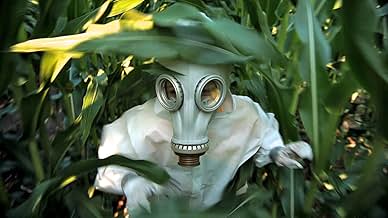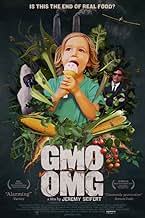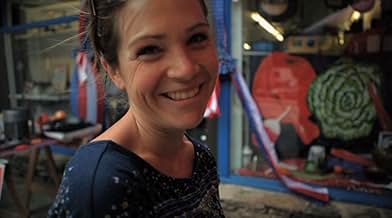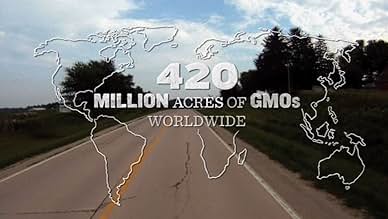GMO OMG
- 2013
- 1h 30min
El cineasta Jeremy Seifert viaja a Haití, París, Noruega y Monsanto, investigando el impacto de los OGM en niños, el planeta y la libertad de elección.El cineasta Jeremy Seifert viaja a Haití, París, Noruega y Monsanto, investigando el impacto de los OGM en niños, el planeta y la libertad de elección.El cineasta Jeremy Seifert viaja a Haití, París, Noruega y Monsanto, investigando el impacto de los OGM en niños, el planeta y la libertad de elección.
- Premios
- 4 premios ganados en total
- Self - President, Millennium Institute
- (as Hans Herren)
- Self - Professor, University of Caen
- (as Gilles-Eric Seralini PhD)
- Self - Co-Founder, Seed Savers Exchange
- (as Diane Whealy)
Opiniones destacadas
Monsanto, as any other corporate company, do not care about people, environment or the future of humans and nature. We have created the system when companies care only, but only, about own profit and never-ending profit growth for its shareholders. GMO itself does not have to be bad, but our capitalism without regulations and limits allows to exploit it in the worst possible way, killing nature and even people. Ask about BT cotton in underdeveloped countries as well, pretty interesting things are happening there!
This prompts concern for Seifert as a father and, well, a consumer, as he begins to question the contents of everything he is eating. Because the presence and use of GMOs need not be labeled on food in America, it brings question as to whether or not the common phrase of "all natural" holds any leverage. On top of that, what are the effects of GMOs on the human body in the long run? If they are safe and harmless, what's the issue in labeling them? Have we all become involuntary participants in a large, global experiment at the expense of humongous seed corporations?
Such questions are either directly or indirectly peddled by the documentary, and its big point of attack goes in the direction of Monsanto, one of the largest seed/chemical manufacturers in the world. Monsanto kickstarts a lot of farms and agriculture by forcing farmers to trade their natural seeds in order to use the exclusive Monsanto seeds. The company made headlines following the devastating earthquake in Haiti, when it sent over four-hundred tons of seeds to their community, gifting the seeds and allowing them to use them only if the country agreed to stop using their own natural seed. The Haitian community saw this as a backhanded attempt at kindness, as the natural seed holds immense importance in the country, and Monsanto's genetically-modified seed seemed far less attractive.
Seifert persists on to show the impact of Monsanto, through colorful, legible graphs, along with batting off startling statistics. For one, eighty perfect of all processed foods contain GMOs, with eight-five and ninety-one percent of corn and soy being genetically-modified as well. About one-hundred and sixty-five acres in the United States contain genetically-modified crops with about four-hundred and twenty acres housing them all over the world. One of the most alarming things presented in the film is how farms with non-GMO crops are affected negatively by those bearing GMOs. When crops are injected with special chemicals, they shed or bear the chemicals, and when the wind blows, spread the chemicals to other locations. Non-GMO farms in close proximity with GMO farms are often affected by the latter's unintentional spread of chemicals, allowing tests for the quality of the crops to become skewed, which are then met with repercussions from Monsanto's legal team.
Seifert presents all of this to us in a way that, while sometimes too hardened on statistical data, is digestible and easy to follow, especially given the fact that, judging to the beginning of the film, few know what GMOs are and where they can be found. Whether you support the use of genetically-modified organisms and see no harm in it, or find they're an abhorrent route for mankind to make an attempt to "play God," as Seifert bills it in the film, I don't see a harm in wanting to know the health effects of something found in an overwhelming majority of the foods we eat. This is part of the reason I enjoy Seifert's approach to the subject matter, as it forms a thoughtful outline and conversation.
What I didn't enjoy, however, was Seifert's rapid descent into negativity over GMOs, which seemed to happen all too quickly. From the beginning, we see a concerned father wanting to get to the bottom of what's in his food. By the half hour mark, we can see Seifert has clearly taken the pathway to being against the use of GMOs, which is fine if the film had started out by taking that stance rather than trying to travel down the middle of the road. Once Seifert starts digging into the potential harms of GMOs, he never revisits or adheres to what one thought he would in the beginning of the film, which is a fair analysis of both sides. In an age where prolific fact-checking has made every documentary at least questionably authentic, GMO OMG would've benefited from an equal examination not only for intellectual purposes but for consistency purposes as well.
Yet, it's sophomoric to dismiss GMO OMG has a film with no substance or thought-provoking questions whatsoever. Seifert gets almost philosophical and contemplative when he talks about the pervasive patenting and trademarking of seeds and wildlife that is occurring with big seed corporations like Monsanto, Du Point, and Syngenta, saying these companies are in a "race to own the building blocks of life." He questions the ethical behavior of corporations - in a way that's very popular right now - about their evasive ways to avoid questioning on the GMOs used in their products in a way that would lead any reasonable person to assume there is something to hide. The only detractor to GMO OMG is that Seifert picks a side far too easily and, in turn, compromises hope for a mostly-unbiased analysis.
Directed by: Jeremy Seifert.
The reporter makes it very clear that he doesn't understand the difference between GMO and organic foods, which is quite worrying when he is presenting his view on GM foods. He also seems to think that if a fish eats GM soy in a fish pellet then the fish itself is genetically modified.
He constantly tells us that there are no peer reviewed studies on the safety of GMO foods - although there are, in fact, over 2,000 peer reviewed studies... none of which have found any evidence that GMOs are harmful in anyway to humans.
We are told that modifying crops is something we have never done before and the reporter asks a farmer what he thinks God would make of this "new" technology. Leaving aside the God aspect, modifying food is nothing new at all - humans have been doing it since the beginning of agriculture. The only thing that is new is the techniques being used.
At one point we are told of a single study that claims organic farming methods can produce higher crop yields than conventional methods, despite this result being contrary to every other piece of research and despite organic not being the same as GMO.
This "documentary" is very one-sided and ignores great swathes of evidence. It's said that if all the world's experts agree on a topic then a layman should probably take their word for it. In the case of GMOs health groups across the world agree that GMOs are safe to eat and safe for the environment - this documentary is simple scaremongering.
¿Sabías que…?
- Citas
Dennis Kucinich: GMO - Organisms in which the genetic material DNA has been altered in a way that does not occur naturally. 2 basic types of GMOS: Pesticide producers and Herbicide Resisters. PP kills insects like Monsanto's BT Corn, a gene from a naturally occurring bacteria is inserted into the DNA of corn. The modified corn releases a toxin that kills insects. Herbicide Resisters are immune to weed killer, like round up ready. The herbicide is inserted into the plant DNA to make it resistant to round up. The very beginnings of agriculture started 10,000 years ago. Around 900AD, the chinese started using arsenic sulfides in their planting. In 1945, 200 million pounds of pesticides were used. By 2000, it was 5.1 billion pounds of pesticides. Now over 500 species of bugs are resistant to pesticides. After 30 years of side by side comparisons b/n organic and chemical agriculture, the rod ale farming systems trial proved that organic yields match conventional yields. Organic corn yields were 31% higher than convention in years of drought. Conventional systems emit nearly 40% more greenhouse gases per pound of crop produces that the organic systems. Organic fields increase groundwater recharge and reduce runoff. 60 countries require the labeling of GMOS, and we can't even get 1 single state due to Monsanto. 6 million people in California voted for prop 37 to label GMOs but the industry paid 45 million dollars to make sure it wouldn't pass. in 1992 under heavy pressure from the biotech industry, the FDA declared that GMOs were generally recognized as safe. GRASS. There's something extremely wrong when the government becomes captive to a single industry and pushes non-renewal, debt creating seeds that destroy bio diversity. The biotech industry spent $547.5 million lobbying congress from 1999-2009. Over 300 former congressional and White House Staff members are now employed by Biotech firms as lobbyists. Gates Foundation purchases 500,000 Monsanto Shares, Monsanto and Walmart team up to feel GMO sweet corn. Wikileaks cables reveal state dept. promoting GMOs abroad. 2 Studies point to common pesticide as a culprit in declining bee colonies. On India's farms, plague of suicide and they're citing Monsanto. US Discovery of rogue GMO wheat raises concerns over controls. GMOs are a form of slavery.
- ConexionesReferenced in Listen Up Philip (2014)
Selecciones populares
- How long is GMO OMG?Con tecnología de Alexa
Detalles
- Fecha de lanzamiento
- Países de origen
- Sitios oficiales
- Idiomas
- También se conoce como
- パパ、遺伝子組み換えってなぁに?
- Productoras
- Ver más créditos de la compañía en IMDbPro
Taquilla
- Total en EE. UU. y Canadá
- USD 47,558
- Fin de semana de estreno en EE. UU. y Canadá
- USD 15,100
- 15 sep 2013
- Total a nivel mundial
- USD 47,558
- Tiempo de ejecución1 hora 30 minutos
- Color
Contribuir a esta página

























